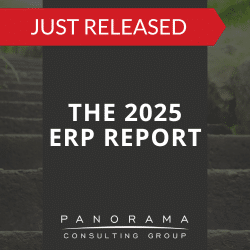To understand how ERP myths start, you first need to understand what it’s like to be an ERP vendor:
Being an ERP vendor who not only sells but also implements software is a challenging endeavor because it requires a team of technical resources that understands the innerworkings of each of the vendor’s products and offerings. This is especially challenging for vendors who are constantly improving and expanding their offerings with new releases and new technology.
In a dynamic environment, frustration can brew among technical resources, which can result in high turnover rates. This complicates an already challenging situation.
What does this all mean for your organization and your ERP implementation? It means you must do your due diligence because there are probably a few things your ERP vendor doesn’t want you to know.
A Large Governmental Entity's Failed Implementation
Panorama’s Expert Witness team was retained to provide a forensic analysis and written report to the court regarding the failed implementation of a major software developer’s ERP/payroll system.
7 ERP Myths Vendors Want You to Believe
ERP vendors sometimes portray a reality that’s slightly inaccurate in order to win business. When organizations take vendors at their word, these misconceptions spread through the industry and become ERP myths that are rarely challenged.
Myth #1 – Your ERP vendor has experience implementing the latest version of their software product.
In reality, they probably haven’t implemented the latest version for any of their clients. How could they if it has only been released for a few months?
While this doesn’t mean you shouldn’t purchase the latest version, it does mean you should build buffers into your ERP project plan to account for unexpected timeline expansions and budget increases.
Myth #2 – Your vendor has experience implementing software in your specific industry.
While this may often be true, don’t assume it is unless the vendor has proven it by providing references. Some vendors will tout their experience in industries related to yours while conveniently neglecting to mention experience in your specific industry.
Myth #3 – All the vendor’s implementer resources have been with the company forever.
In reality, some team members may have only been with the company for a short while. It’s easy to be fooled when your vendor focuses on the tenure of a few key players and distracts you from reviewing the backgrounds of other team members.

Myth #4 – Your vendor has a unique implementation methodology that is faster and more effective than other implementers’ methodologies.
While your vendor may have unique descriptions for tasks and throw in a few distinctive ways of doing things, these methods are usually superficial and don’t materially change how long you’ll need to spend on each task.
In fact, there is no such thing as an implementation shortcut. No matter what, you’ll have to spend a certain amount of time and money to ensure ERP implementation success.
Myth #5 – Your vendor has sufficient resources for all areas of the implementation.
It’s easy to believe this even if the vendor hasn’t explicitly said they have all the experts you need. It’s up to you to ask specific questions and not make assumptions.
For example, vendors often lack sufficient organizational change management resources. We recommend working with a third-party ERP consultant and asking your vendor if they have sufficient resources for all the best practice change management activities your ERP consultant recommends.
Myth #6 – Your new ERP system will have all the features the vendor promised.
This ERP myth is common because during the sales cycle, vendors often promote features that are not yet available. As a result, organizations assume these features will be included in the system they end up purchasing. By the time they realize the system lacks key functionality, it is often too late because they’ve already signed the contract.
Myth #7 – All the vendor’s resources will be around for the long haul.
If a key member of the vendor’s team just gave their two weeks’ notice, the vendor may not freely offer this information. It’s up to you to ask.
As discussed earlier, turnover is common, so be sure to also ask about the vendor’s transition plan for getting new resources up to speed.
Have You Believed the ERP Myths?
If so, our ERP Expert Witness team can help you prove your case. While not all the items above constitute ERP vendor misrepresentation or fraud, many of them do, which might mean you have reason to file an ERP lawsuit.
When you do, be sure to hire ERP experts who use a team-based approach. Our team assists attorneys and organizations in building background reporting, preparing for trial and more. Request a free consultation below to speak with our experts.













